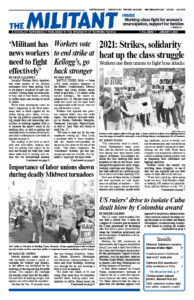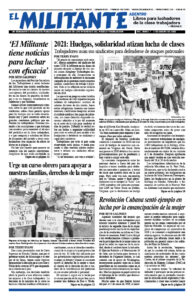The U.S. rulers’ drive to isolate Cuba was dealt a setback Dec. 8 when the Congress of Colombia gave an award to the Cuban government for facilitating talks that led to a peace agreement between the Colombian government and the Revolutionary Armed Forces of Colombia (FARC).
Marking the fifth anniversary of those accords, the Congress awarded the Grand Cross with a Gold Plate Order to the Cuban and Norwegian ambassadors for their governments’ support to the negotiations. And the legislators called on President Joseph Biden’s administration to remove Cuba from Washington’s list of State Sponsors of Terrorism.
In May, Biden renewed the Donald Trump administration’s inclusion of Cuba on the list, a move that imposes severe financial and other restrictions. The Biden administration has kept in place over 200 sanctions against Cuba imposed by the previous administration. These measures intensify hardships facing the people on the island, and deepen Washington’s six-decade-long economic war aimed at crushing the socialist revolution made by Cuba’s workers and farmers.
“It’s a disgrace what was done to Cuba by including it in the list of terrorist organizations,” Sergio Jaramillo said Dec. 6. Jaramillo was the main representative of the former government of President Juan Manuel Santos during the negotiations with the FARC. “This is something we have to fix because Colombia is in debt to Cuba.”
Since 1998, the Cuban government has taken initiatives to end the armed conflict and has hosted negotiations on the island. The Colombian government established formal talks with the National Liberation Army (ELN) in 2017, with the support of the Cuban and Norwegian governments.
In January 2019 the current government of Iván Duque ended talks with the ELN after a car bombing in Bogotá left 22 police cadets dead. It demanded the guerrilla army cease kidnappings and release all hostages. Duque, who succeeded Santos, also demanded the Cuban government extradite the ELN commanders who traveled to the island for the negotiations, something both Havana and Oslo say is a violation of the protocol agreed upon by both parties to facilitate the talks.
The Trump and Biden administrations have used Duque’s slanderous accusations against the Cuban government to justify keeping Cuba on the U.S. rulers’ terrorist list. But the real record of the leadership forged by Fidel Castro during the revolutionary war to overturn the Fulgencio Batista dictatorship gives the lie to this claim.
Cuba never mistreated prisoners
Fidel Castro and the leadership of the Cuban Revolution vigorously opposed the use of terrorist methods, like kidnapping of civilians, assassination of politicians, and mistreatment of enemy soldiers.
The methods used by the FARC were the opposite of those followed by the movement that led working people to take power in Cuba and make a socialist revolution. Such methods would have made it impossible to deepen the organization and mobilization of workers and farmers.
“My opposition to holding prisoners of war, to applying policies that humiliate them or subject them to extremely harsh jungle conditions, is well known,” Castro wrote in his book La Paz en Colombia (Peace in Colombia) published in 2008, and available in Spanish in PDF format. The conduct of Cuba’s revolutionary leaders reflected their moral stature and deep confidence in the capacities of workers and farmers as the makers of revolutionary change.
Over decades of armed conflict the Colombian government asked Havana to mediate in peace talks and hostage situations. One of those times was in 1983, when ELN combatants kidnapped the brother of then Colombian President Belisario Betancourt. Castro condemned the kidnapping and his intervention led to the hostage’s release.
“In our view, this action against a close relative of yours is not ethical, neither political or just under no circumstances,” wrote the Cuban leader in a letter sent to the Colombian president, published in La Paz en Colombia. “To hurt him politically or to take his life, would represent a crime that should never be committed by those who really act in the name of revolutionary ideas.”
The initiative to grant the Order to Cuba and Norway came from senators of the Comunes party, formed by the FARC after its military demobilization.
“Together with Cuba, we have had the privilege and great responsibility of being the guarantors of the peace process in Colombia and we deeply value it,” said John Petter Opdahl, Norway’s ambassador at the ceremony presenting the awards.

